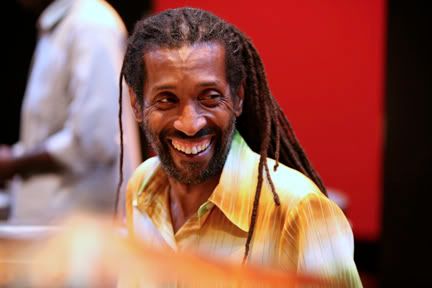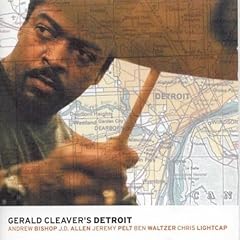Pianist Kenn Cox /Photo by C. Andrew Hovan
Yesterday evening, Kenn, my editor W. Kim Heron at the Metrotimes, a weekly newspaper in Detroit, MI., emailed me. The emailed said you passed away early Friday morning in your Westside Detroit home you shared with your wife of 42 years Barbara. You had lung cancer. Kenn I wanted to blog about you soon after reading the email, but I could formulate the right combination of words to convey how much I respected you as a jazz musician and human being. Instead of blogging, I went to Targets. Shopping for some reason helps clear my mind.
When I returned home, I still was not ready to write about you so I watched a rerun of the 90’s sitcom Martin. Then a dumb black exploitation movie titled Original Gangsta, which stared Fred Williamson, Jim Brown, Ron O’Neal and Pam Grier. When the movie ended, I was tired and I could not muster enough energy to write.
I had an entire day now to come to grips with your passing, and frankly, I have run out of excuses. This evening, I planned to go to Cliff Bells to hear the Hot Club of Detroit and saxophonist James Carter, but I decided—you probably will think I am absolutely nuts—to stay home to write this blog.
I did not know you as intimately as I knew your comrades the late pianists Teddy Harris and Harold McKinney, drummer Roy Brooks, and saxophonist Donald Walden who helped me out when I set out to make a name for myself as a jazz journalist. I bet when they learn God summoned you home they prepared a lavish home coming celebration. Man, I would love to attend that gig.
I wonder, though, how God plans to divide the solo time among you, Harris and McKinney. God has three of Detroit’s best jazz pianists. Kenn, I heard about your stellar reputation as a jazz historian and as a remarkable jazz pianist countless times before I finally met you last year when I interviewed you for an article my editor encouraged me to write.
We talked for two hours in the family room. The piano you learned to play on was in the room along with memorabilia you collected traveling the world. That afternoon you smoked, and we drank Budweiser beer as you recounted pivots moments of your career. I got the impression; however, you felt uneasy talking about yourself, which may explain why you talked more about the musicians who influenced you such as the late pianist Alice Coltrane who befriended and encouraged you when you started out.
Then you talk about the each member of your band Kenny Cox and the Contemporary Jazz Quintet. You had a swell time working with trumpeter Charles Moore, drummer Danny Spencer, bassist Ron Brooks, and tenor saxophonist Leon Henderson (saxophonist Joe Henderson’s younger brother) and about the recordings you guy made while signed to Blue Note Records Kenny Cox and the Contemporary Jazz Quintet and Multidirection.
You fronted many great bands during your career, but as I listened to you brag about how great each member was I gathered the Contemporary Jazz Quintet was your most cherished. After the interview, you walked me to my car, and I jokingly said I felt as though I had just completed a jazz history exam.
I must be honest. Before that interview I was unfamiliar with your history, and I was unaware you were once signed to Blue Note Records. I discovered Blue Note reissued the albums at the Festival of Jazz and improvised Music. I set next to a skinny white guy who wore a Detroit Tiger baseball cap, khaki shorts, and he swayed back and forth while the musician played.
I took notes at the festival because the publisher of Signal to Noise, a music magazine based in Houston, hired me to review the music fest. During the intermission, the skinny white guy asked me what newspaper I wrote for, but I cannot recall how we began talking about your music. During the conversation, the guy said Blue Note had recently reissued the albums on a single disc.
The next day, I purchased the album. Two hours later, I was in love with it. I called my editor to tell him I wanted to write about you. Just so happened, my editor had heard you at the Detroit Institute of the Arts with your new group Kenn Cox and Drum, and weeks later playing with your trio at Baker’s Keyboard Lounge. At Baker’s, my editor said you played show tunes so beautifully you made him cry. He was enthusiastic about publishing a piece about you. He also sent me some bootlegged albums of your live concerts, which I listened to while I wrote the article.
Before interviewing you, I heard you perform in the early 90’s with saxophonist Donald Walden at the Museum of African-American History, and your work on James Carter’s live album Live at Baker’s Keyboard Lounge. You played elegantly a la Duke Ellington and Oscar Peterson. When you soloed, you took your time giving each note equal consideration. It seem like your fingers were made of cashmere when you performed a ballad.
Kenn, you treated me respectfully as if you had known me for years. You were gracious and welcoming. I wish I had more recollections of you. I felt fortunate, however, to have spent that afternoon with you.
When you arrive in heaven, let Donald, Roy, Teddy, and Harold know that I missed them dearly. Do not tell them it took me so long to express how much I respected you, and cherished the two hours we spent talking last year about you life as an accomplished jazz pianist.
 Last Sunday, I posted my five favorite albums released in 2008. Today I want to share with the readers Of I Dig Jazz my top five concerts of 2008. First, I should explain I attended many performers, and received quite a few good albums. I challenged myself. I only selected five concerts; choosing more would have been too easy.
Last Sunday, I posted my five favorite albums released in 2008. Today I want to share with the readers Of I Dig Jazz my top five concerts of 2008. First, I should explain I attended many performers, and received quite a few good albums. I challenged myself. I only selected five concerts; choosing more would have been too easy.
























 I’m glad you decided to stick around. It’s passed 2:00am. My blog is usually closed for the night, but it’s not often I get the opportunity to chat face to face with a living icon. Mr. Nelson the next round is on the house. By the way, who convinced you to collaboration with trumpeter Wynton Marsalis? Kudos to the individual or committee who felt this collaboration would fly.
I’m glad you decided to stick around. It’s passed 2:00am. My blog is usually closed for the night, but it’s not often I get the opportunity to chat face to face with a living icon. Mr. Nelson the next round is on the house. By the way, who convinced you to collaboration with trumpeter Wynton Marsalis? Kudos to the individual or committee who felt this collaboration would fly.
